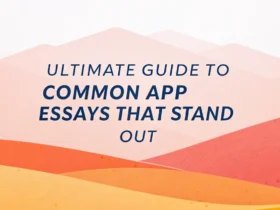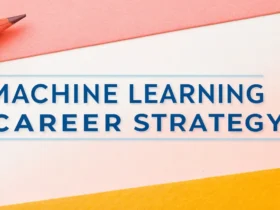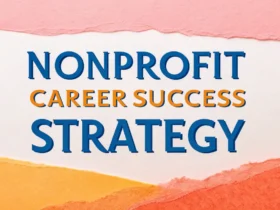Digital marketing: it can feel like a maze. Terms shift fast, and what worked last year might not work today. Are you keen to carve out your place in the digital world? This guide will act as your map through the maze of career options in digital marketing.
Forget vague advice. Here, we’ll break down what digital marketing really means, the skills you’ll need to thrive, and how to land the online role you’re after. Let’s explore the landscape.
Navigating the World of Digital Marketing
Digital marketing is more than just ads online. It’s about connecting with people, understanding their needs, and crafting messages that resonate. It uses the power of the Internet, mobile devices, social media, search engines, and other channels to reach consumers.
This field covers a vast array of specializations. You could be the mastermind behind a social media campaign. You could be the data guru who optimizes websites for peak performance. Or, you could be the content creator crafting stories that captivate and convert.
Why Choose Digital Marketing?
Why should you consider digital marketing as a career path?
- High Demand: Companies need skilled digital marketing experts to stay competitive. Jobs are there.
- Creative Outlet: This field lets you mix analytical skills with creative thinking.
- Constant Learning: The digital world shifts quickly. You’ll always be learning, which can be exciting.
- Measurable Results: Unlike some marketing roles, digital marketing offers ways to track how well your efforts are working.
- Diverse Opportunities: From startups to global corporations, every industry needs digital marketing.
Is Digital Marketing Right for You?
Before you leap in, ask yourself these questions:
- Do I enjoy keeping up with new tech?
- Am I comfortable analyzing data?
- Can I think creatively and solve problems?
- Do I like to write or create visuals?
- Am I a strong communicator?
If you answered “yes” to most of these, digital marketing might be a good fit.
Key Skills for Digital Marketing Success
To excel in digital marketing, you’ll need a mix of technical and soft skills.
Technical Skills: The Foundation
- Search Engine Optimization (SEO): Knowing how search engines work is key. Learn how to optimize content, do keyword research, and build links.
- Search Engine Marketing (SEM): This involves paid advertising, like Google Ads. Understand how to create and manage campaigns.
- Social Media Marketing: Learn how to use social media platforms for marketing. This includes content creation, advertising, and community management.
- Content Marketing: This focuses on creating valuable, relevant, and consistent content to attract and retain an audience.
- Email Marketing: Email is still a powerful tool. Know how to build lists, design emails, and track results.
- Data Analytics: Analyzing data is crucial. Learn how to use tools like Google Analytics to track website traffic, user behavior, and campaign performance.
- Website Basics: Understanding HTML, CSS, and content management systems (CMS) like WordPress is helpful.
- Marketing Automation: Learn how to use tools to automate marketing tasks.
- Conversion Rate Optimization (CRO): Learn how to optimize websites and landing pages to increase conversions.
- Mobile Marketing: Understand how to reach customers on their mobile devices through ads, apps, and SMS marketing.
Soft Skills: The Differentiators
- Communication: You need to explain complex ideas simply, both in writing and verbally.
- Creativity: Digital marketing needs fresh ideas and inventive campaigns.
- Analytical Thinking: The skill to examine data, see patterns, and make smart moves.
- Problem-Solving: Every campaign has bumps in the road. You need to be able to find solutions.
- Adaptability: The digital landscape changes fast. The ability to shift and evolve is key.
- Project Management: Many digital marketing roles require handling different projects at the same time.
- Teamwork: You’ll often work with designers, writers, and other marketers.
- Time Management: The ability to manage time well is key for meeting deadlines.
- Customer Empathy: See things from the customer’s view. Know their wants and needs.
- A Growth Mindset: A willingness to learn and grow will take you far.
Popular Digital Marketing Roles: What Can You Do?
Here are some common digital marketing roles you might encounter:
SEO Specialist: The Search Engine Guru
An SEO specialist improves a website’s visibility in search engine results. This means more organic (unpaid) traffic.
- Responsibilities:
- Keyword research
- On-page optimization (title tags, meta descriptions, content)
- Link building
- Technical SEO audits
- Tracking and reporting
- Tools:
- Semrush
- Ahrefs
- Google Search Console
- Google Analytics
SEM/PPC Specialist: The Paid Advertising Expert
SEM/PPC (pay-per-click) specialists manage paid advertising campaigns on search engines. They aim to drive traffic and conversions through paid ads.
- Responsibilities:
- Keyword research for paid campaigns
- Ad creation and testing
- Bid management
- Landing page optimization
- Budget management
- Performance analysis
- Tools:
- Google Ads
- Microsoft Advertising
- Google Analytics
Social Media Manager: The Voice of the Brand
A social media manager handles a brand’s social media presence. They create content, engage with followers, and run social media ads.
- Responsibilities:
- Content planning and creation
- Community management
- Social media advertising
- Performance tracking
- Staying up-to-date on social media trends
- Tools:
- Hootsuite
- Buffer
- Sprout Social
- Social media platform analytics
Content Marketing Manager: The Storyteller
A content marketing manager develops and executes a content strategy. They aim to attract and engage an audience through valuable content.
- Responsibilities:
- Content strategy development
- Blog post writing and editing
- Ebook and whitepaper creation
- Infographic design
- Video script writing
- Content promotion
- Tools:
- Google Analytics
- Semrush
- BuzzSumo
- Content management systems (CMS)
Email Marketing Specialist: The Master of the Inbox
An email marketing specialist manages email campaigns to nurture leads and drive sales.
- Responsibilities:
- Email list management
- Email design and copywriting
- A/B testing
- Segmentation
- Automation
- Performance tracking
- Tools:
- Mailchimp
- Klaviyo
- ConvertKit
- Marketing automation platforms
Digital Marketing Analyst: The Data Detective
A digital marketing analyst analyzes data to improve marketing performance. They give insights and recommendations based on data.
- Responsibilities:
- Tracking and analyzing website traffic
- Analyzing campaign performance
- Creating reports
- Giving recommendations for improvement
- A/B testing analysis
- Tools:
- Google Analytics
- Google Tag Manager
- Data visualization tools (Tableau, Google Data Studio)
- Excel
Conversion Rate Optimization (CRO) Specialist: The Conversion Optimizer
A CRO specialist enhances websites and landing pages to boost conversions.
- Responsibilities:
- A/B testing
- User research
- Analyzing user behavior
- Making recommendations for website improvements
- Landing page optimization
- Tools:
- Google Optimize
- Optimizely
- Hotjar
- Crazy Egg
Digital Marketing Manager: The Orchestrator
A digital marketing manager oversees all digital marketing activities. They create and execute strategies to achieve business goals.
- Responsibilities:
- Developing digital marketing strategies
- Managing digital marketing budgets
- Leading a digital marketing team
- Tracking and analyzing performance
- Staying up-to-date on industry trends
- Skills:
- Strong understanding of all digital marketing channels
- Leadership skills
- Budget management
- Analytical skills
- Communication skills
Marketing Automation Specialist: The Efficiency Expert
A marketing automation specialist implements and manages marketing automation systems. They improve efficiency and personalize customer experiences.
- Responsibilities:
- Setting up and managing marketing automation workflows
- Segmenting email lists
- Creating personalized email campaigns
- Tracking and analyzing performance
- Integrating marketing automation systems with other platforms
- Tools:
- Marketo
- HubSpot
- Pardot
- ActiveCampaign
Breaking into Digital Marketing: Your Path to Success
Okay, you’re sold on digital marketing. How do you actually land a job?
Education and Certifications: Building Your Knowledge Base
- Formal Education: A degree in marketing, communications, or a related field can be helpful. But it’s not always needed.
- Online Courses: Platforms like Coursera, Udemy, and Skillshare offer great digital marketing courses.
- Certifications: Getting certified can improve your resume. Consider certifications from Google, HubSpot, and other industry leaders.
Here are some certifications to consider:
- Google Ads Certifications: Show proficiency in Google Ads.
- Google Analytics Individual Qualification (GAIQ): Validates your knowledge of Google Analytics.
- HubSpot Certifications: Cover different areas of inbound marketing.
- Semrush SEO Toolkit Certification: Confirms your expertise in using Semrush for SEO.
- Facebook Blueprint Certifications: Prove your skills in Facebook and Instagram advertising.
Building a Portfolio: Show, Don’t Just Tell
A portfolio shows off your skills and accomplishments. Here are a few options:
- Personal Website: Create a website to showcase your work.
- Freelance Projects: Take on small freelance jobs to gain experience.
- Personal Projects: Start a blog, run a social media account, or create an email newsletter.
- Case Studies: Document your successes and write case studies.
- Volunteer Work: Offer your digital marketing skills to nonprofits or local businesses.
Networking: Connecting with the Community
- Attend Industry Events: Go to conferences, workshops, and meetups.
- Join Online Communities: Engage in digital marketing groups on LinkedIn, Facebook, and Reddit.
- Connect with Professionals: Reach out to people in the field. Ask for advice and build connections.
The Job Search: Landing Your Dream Role
- Tailor Your Resume: Adjust your resume to match each job description.
- Write a Strong Cover Letter: Show your interest in the company and the role.
- Practice Your Interview Skills: Be ready to answer common interview questions.
- Network Actively: Let your connections know you’re looking for a job.
- Be Persistent: Don’t give up if you don’t get the first job you apply for.
Finding the Right Company: Where Do You Fit?
The “right” company depends on what you want.
- Startups: Fast-paced, lots of chances to learn, but less job security.
- Agencies: Work with various clients, good for quick growth, but can be demanding.
- Corporations: More structured, good benefits, but can be slower-paced.
- Nonprofits: Chance to do good, might be lower pay, but fulfilling work.
Staying Ahead of the Curve: The Ever-Evolving Digital Landscape
Digital marketing is always changing. To stay competitive, you need to keep learning:
- Read Industry Blogs: Follow blogs like the Semrush Blog, Moz Blog, and MarketingProfs.
- Listen to Podcasts: Check out podcasts like the Marketing Over Coffee and the Social Media Marketing Podcast.
- Follow Industry Leaders: Stay up-to-date on what leaders in the field are saying.
- Experiment with New Tools: Don’t be scared to try new platforms and software.
- Analyze Data: Keep an eye on the metrics and see what’s working and what’s not.
Ethical Considerations in Digital Marketing
As digital marketing grows, it’s key to think about ethics:
- Transparency: Be clear and honest in your marketing. Don’t trick people.
- Data Privacy: Respect people’s privacy. Follow data protection laws.
- Responsible Advertising: Don’t make false claims or target vulnerable groups.
- Accessibility: Make your marketing available to everyone, including people with disabilities.
Is a Digital Marketing Career Worth Pursuing?
The job market is competitive. But, digital marketing is key to business success. This means skilled digital marketing folks will always be in demand.
If you’re eager to learn, happy to adapt, and driven to help businesses grow, then a career in digital marketing could be a great choice. You can blend creative skills with data. You can make a real impact.
So, equip yourself with the right skills, build a strong portfolio, and connect with the digital marketing world. There is a place for you in the digital realm.















Leave a Reply
View Comments